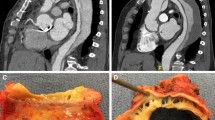Abstract
Purpose
Acute type-A aortic dissection with a clotted false lumen is often managed conservatively; however, we found that surgery has a better outcome.
Methods
Enhanced computed tomography (CT) showed a clotted false lumen in the ascending aorta in 38 (33.3%) of 114 patients with acute type-A aortic dissection. After the exclusion of 8 patients whose condition was too critical for comparison, 13 patients who were hemodynamically stable and did not have pericardial effusion, organ ischemia, or a dilated ascending aorta greater than 50 mm in diameter, were managed conservatively (group C) and 17 were managed surgically (group S). We compared the early and late results of both groups.
Results
The early mortality rates were 23.1% in group C and 0% in group S (P = 0.037). The early deaths in group C were caused by redissection in the acute phase. The actuarial survival rates and dissection-related event-free rates 5 years after onset in groups C and S were 64.1% and 80.8% (P = 0.131) and 46.2% and 92.9% (P = 0.002), respectively.
Conclusion
The early mortality rate and dissection-related event-free rate were better after surgery than after conservative treatment. The indications for conservative management should be limited because redissection is usually fatal.
Similar content being viewed by others
Author information
Authors and Affiliations
Rights and permissions
About this article
Cite this article
Kurimoto, Y., Morishita, K., Kawaharada, N. et al. Initial Management of Acute Type-A Aortic Dissection with a Thrombosed False Lumen: A Retrospective Cohort Study. Surg Today 34, 652–657 (2004). https://doi.org/10.1007/s00595-004-2798-1
Received:
Accepted:
Issue Date:
DOI: https://doi.org/10.1007/s00595-004-2798-1




